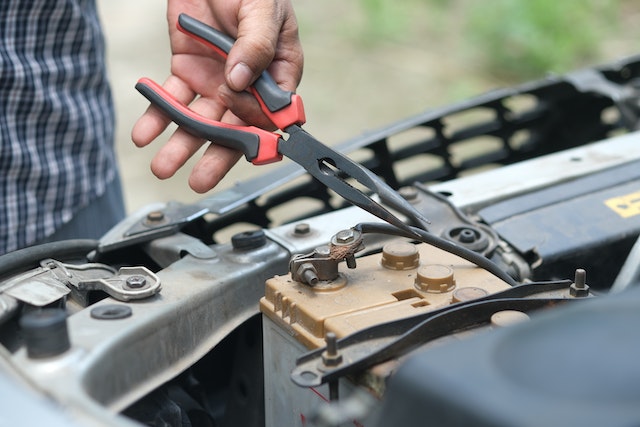Car batteries are an essential component of your vehicle, providing the necessary power to start the engine and operate various electrical systems. However, like any other part of your car, batteries have a limited lifespan and require proper maintenance to ensure their optimal performance. In this article, we will discuss some practical tips and tricks to extend the life of your car battery and avoid unexpected breakdowns on the road.

Understanding the Basics of Car Batteries
Before we dive into the tips and tricks to extend the life of your car battery, it’s essential to understand the basics of how it works. A car battery is a rechargeable power source that stores electrical energy and delivers it to the starter to crank the engine. It also powers various electrical systems in your car, such as lights, radio, and air conditioning, when the engine is off.
Most car batteries are lead-acid batteries, consisting of six cells filled with an electrolyte solution of sulfuric acid and water. When the battery is fully charged, lead dioxide and lead sulfate form on the positive and negative plates, respectively, creating a potential difference between them. When the battery discharges, the sulfuric acid reacts with the lead sulfate to form lead and lead dioxide, releasing electrical energy in the process.
How Long Do Car Batteries Last?
The lifespan of a car battery depends on several factors, such as its type, usage, and maintenance. Most car batteries last between three to five years, but some may last up to seven years or more with proper care.
Factors Affecting the Lifespan of Your Car Battery
Several factors can affect the lifespan of your car battery, including:
- Climate: Extreme temperatures, either too hot or too cold, can shorten the life of your battery.
- Usage: Frequent short trips, long periods of inactivity, and excessive use of electrical accessories can drain your battery quickly.
- Maintenance: Neglecting proper maintenance, such as keeping your battery clean and free of corrosion, can reduce its performance and lifespan.
Signs of a Weak Car Battery
It’s essential to recognize the signs of a weak car battery before it fails completely, leaving you stranded on the road. Some common signs include:
- Slow cranking: If your engine cranks slowly or takes longer than usual to start, it’s a sign that your battery is weak.
- Dim lights: If your headlights or interior lights appear dim or flicker when you start the car, it indicates a weak battery.
- Clicking sound: If you hear a clicking sound when you turn the key, but the engine doesn’t start, it means your battery is too weak to power the starter.

Tips to Extend the Life of Your Car Battery
Here are some practical tips and tricks to extend the life of your car battery and avoid unexpected breakdowns on the road:
1. Keep Your Battery Clean and Free of Corrosion
Battery terminals and cables can corrode over time, reducing the flow of electrical current and causing the battery to lose its charge. To prevent this, you should clean your battery terminals and cables regularly with a mixture of baking soda and water. You can use a wire brush or a toothbrush to scrub off any corrosion buildup. Make sure to wear gloves and eye protection and avoid getting the solution on your clothes or car’s paint.
2. Drive Your Car Regularly
Frequent short trips and long periods of inactivity can drain your battery quickly, as the alternator has less time to recharge it. It’s recommended to drive your car regularly for at least 20 to 30 minutes, especially if you’re not using it frequently. This will keep your battery charged and prevent it from discharging completely.
3. Turn Off Electrical Accessories When Not in Use
Leaving your electrical accessories on, such as the radio, air conditioning, or lights, when the engine is off can drain your battery quickly, especially if you’re not driving your car regularly. Make sure to turn off all electrical accessories when you’re not using them, and avoid using them unnecessarily.
4. Avoid Short Trips
Short trips, especially in cold weather, can drain your battery quickly, as the engine needs more power to start in low temperatures. If possible, try to combine your errands into one trip or use public transportation instead of driving your car for short distances.
5. Get Your Battery Checked Regularly
It’s recommended to get your battery checked regularly, especially if it’s more than three years old or if you’re experiencing any of the signs of a weak battery. Most auto parts stores and repair shops offer free battery testing, which can help you diagnose any issues with your battery and prevent unexpected breakdowns on the road.
How to Jumpstart a Dead Battery
If your battery is completely dead and you can’t start your car, you may need to jumpstart it using another car’s battery. Here’s how to do it:
- Park the donor car close to your car, but not touching it.
- Turn off both cars and make sure both cars’ headlights and electrical accessories are turned off.
- Connect the red jumper cable to the positive terminal of the dead battery and the other end to the positive terminal of the donor battery.
- Connect the black jumper cable to the negative terminal of the donor battery and the other end to a metal surface of your car’s engine block, away from the battery and fuel system.
- Start the donor car and let it run for a few minutes.
- Try starting your car. If it starts, let both cars run for a few minutes to charge your battery.
- Disconnect the jumper cables in reverse order, starting with the black cable on the engine block.
When to Replace Your Car Battery
Even with proper maintenance, car batteries have a limited lifespan and will eventually need to be replaced. It’s recommended to replace your battery every three to five years, depending on its usage and condition. Some signs that your battery may need to be replaced include:
- Your battery is more than three years old.
- You’re experiencing frequent starting problems or dead batteries.
- Your battery case is swollen or cracked.
- Your battery terminals or cables are corroded or damaged.
- Your battery fails a load test or a voltage test.
Conclusion
Maintaining your car battery is essential to ensure its optimal performance and lifespan. By following these practical tips and tricks, you can extend the life of your car battery and avoid unexpected breakdowns on the road. Remember to keep your battery clean and free of corrosion, drive your car regularly, turn off electrical accessories when not in use, avoid short trips, and get your battery checked regularly. If your battery is completely dead, you can jumpstart it using another car’s battery. And when it comes to replacing your battery, it’s best to follow the manufacturer’s recommendations and replace it every three to five years, or as needed.
FAQs
How do I know if my car battery is weak?
Some signs that your car battery may be weak include slow cranking, dimming headlights, warning lights on the dashboard, and a sulfurous smell coming from the battery. If you're experiencing any of these symptoms, it's recommended to get your battery checked as soon as possible.
Can I replace my car battery myself?
While it's possible to replace your car battery yourself, it's recommended to have it replaced by a professional. Car batteries contain hazardous chemicals and can be dangerous if mishandled. If you're not comfortable working with car batteries, it's best to have it replaced by a qualified technician.
How often should I check my car battery?
It's recommended to get your car battery checked at least once a year, especially if it's more than three years old or if you're experiencing any signs of a weak battery. Most auto parts stores and repair shops offer free battery testing, which can help you diagnose any issues with your battery.
Can a dead battery be recharged?
In some cases, a dead battery can be recharged using a battery charger. However, if your battery is completely dead, it may need to be replaced. It's recommended to have your battery tested to determine if it can be recharged or if it needs to be replaced.
What is the average lifespan of a car battery?
The average lifespan of a car battery is three to five years, depending on its usage and condition. However, some factors such as extreme temperatures and frequent short trips can shorten the lifespan of a battery. It's recommended to replace your battery every three to five years, or as needed.
